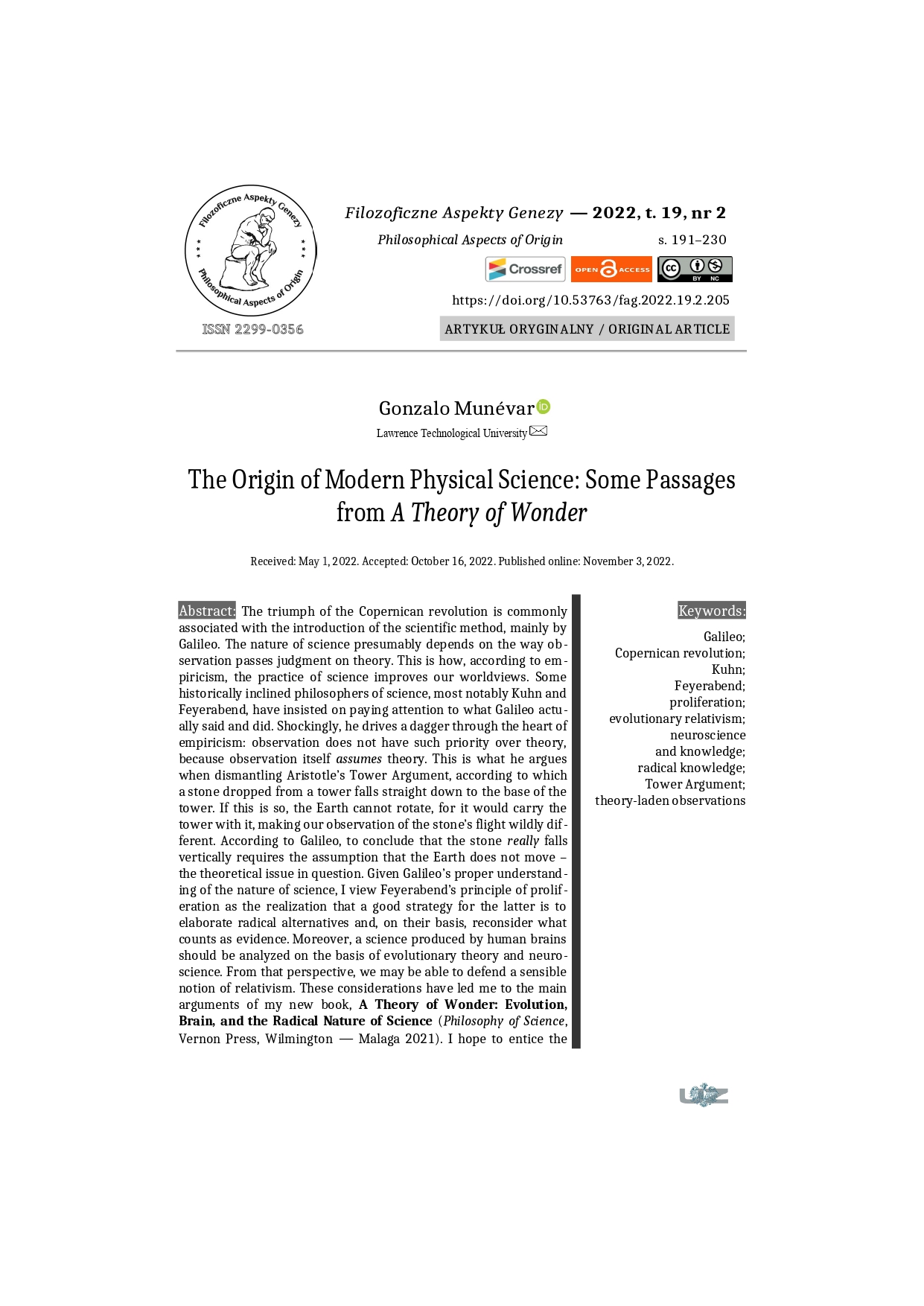
Opublikowane 03.11.2022 — zaktualizowane 22.12.2022
Wersje
- 22.12.2022 - (3)
- 21.12.2022 - (2)
- 03.11.2022 - (1)
Słowa kluczowe
- Galileo,
- Copernican revolution,
- Kuhn,
- Feyerabend,
- proliferation
- evolutionary relativism,
- neuroscience and knowledge,
- radical knowledge,
- Tower Argument,
- theory-laden observations ...More
Prawa autorskie (c) 2022 Filozoficzne Aspekty Genezy

Utwór dostępny jest na licencji Creative Commons Uznanie autorstwa – Użycie niekomercyjne 4.0 Międzynarodowe.
Jak cytować
Abstrakt
The triumph of the Copernican revolution is commonly associated with the introduction of the scientific method, mainly by Galileo. The nature of science presumably depends on the way observation passes judgment on theory. This is how, according to empiricism, the practice of science improves our worldviews. Some historically inclined philosophers of science, most notably Kuhn and Feyerabend, have insisted on paying attention to what Galileo actually said and did. Shockingly, he drives a dagger through the heart of empiricism: observation does not have such priority over theory, because observation itself assumes theory. This is what he argues when dismantling Aristotle’s Tower Argument, according to which a stone dropped from a tower falls straight down to the base of the tower. If this is so, the Earth cannot rotate, for it would carry the tower with it, making our observation of the stone’s flight wildly different. According to Galileo, to conclude that the stone really falls vertically requires the assumption that the Earth does not move – the theoretical issue in question. Given Galileo’s proper understanding of the nature of science, I view Feyerabend’s principle of proliferation as the realization that a good strategy for the latter is to elaborate radical alternatives and, on their basis, reconsider what counts as evidence. Moreover, a science produced by human brains should be analyzed on the basis of evolutionary theory and neuroscience. From that perspective, we may be able to defend a sensible notion of relativism. These considerations have led me to the main arguments of my new book, A Theory of Wonder: Evolution, Brain, and the Radical Nature of Science (Philosophy of Science, Vernon Press, Wilmington — Malaga 2021). I hope to entice the reader into a discussion of some of the issues developed there.
Downloads
Bibliografia
- Aristotle, On the Heavens, Book II, trans. and ed. Stuart Leggatt, Aris & Phillips Classical Texts, Liverpool University Press, Liverpool 1995, Ch. 14, 296b7–24 (written around 350 BCE).
- Barnes Eric C., The Miraculous Choice Argument for Realism, Philosophical Studies 2002, Vol. 111, No. 2, pp. 97–120, https://doi.org/10.1023/A:1021204812809.
- Blackmore Susan, Consciousness, Oxford University Press, New York 2002.
- Bohr Niels (ed.), The Philosophical Writings of Niels Bohr: Essays 1932–1957. On Atomic Physics and Human Knowledge, The Philosophical Writings of Niels Bohr, Vol. 2, Ox Bow, Woodbridge 1987.
- Bohr Niels, Can Quantum Mechanical Description be Complete?, in: Toulmin (ed.), Physical Reality…, pp. 122–143.
- Bohr Niels, The Quantum Postulate and the Recent Development of Atomic Theory, Nature 1928, No. 121, p. 580–590, https://doi.org/10.1038/121580a0.
- Boyd Richard, On the Current Status of Scientific Realism, in: Boyd, Gasper, and Trout (eds.), The Philosophy of Science…, pp. 195–222.
- Boyd Richard, Gasper Philip, and Trout John D. (eds.), The Philosophy of Science, MIT Press, Cambridge 1992.
- Brown James Robert, The Miracle of Science, Philosophical Quarterly 1982, Vol. 32, No. 128, pp. 232–244, https://doi.org/10.2307/2219325.
- Busch Jacob, No New Miracles, Same Old Tricks, Theoria 2008, Vol. 74, No. 2, pp. 102–114, https://doi.org/10.1111/j.1755-2567.2008.00011.x.
- Churchland Paul M., The Engine of Reason, the Seat of the Soul: A Philosophical Journey into the Brain, Bradford Books, MIT Press, London — Cambridge 1996.
- Darwin Charles, On the Origin of Species by Means of Natural Selection, or the Preservation of Favoured Races in the Struggle for Life, John Murray, London 1859.
- Dellsén Finnur, Explanatory Rivals and the Ultimate Argument, Theoria 2016, Vol. 82, No. 3, pp. 217–237, https://doi.org/10.1111/theo.12084.
- Derksen Anthony A. (ed.), The Scientific Realism of Rom Harré, Studies In General Philosophy of Science, Tilburg University Press, Tilburg 1994.
- Edelman Gerald and Tononi Giulio, A Universe Of Consciousness: How Matter Becomes Imagination, Basic Books, New York 2000.
- Einstein Albert, Remarks Concerning the Essays Brought Together in this Co-Operative Volume, trans. Paul Arthur Schilpp, in: Schilpp (ed.), Albert Einstein…, p. 665–688.
- Feyerabend Paul K., Consolations for the Specialist, in: Lakatos and Musgrave (eds.), Criticism and the Growth of Knowledge…, pp. 197–230.
- Feyerabend Paul K., Against Method: Outline of an Anarchistic Theory of Knowledge, Verso Books, London 1978 (first published by New Left Books in 1975).
- Frost-Arnold Greg, The No-Miracles Argument for Realism: Inference to an Unacceptable Explanation, Philosophy of Science 2010, Vol. 77, No. 1, pp. 35–58, https://doi.org/10.1086/650207.
- Galileo, Dialogues Concerning the Two Chief World Systems: The Second Day, in: Matthews (ed.), The Scientific Background to Modern Philosophy…., pp. 61–81 (first published in 1632).
- Galileo, The Assayer, in: Matthews (ed.), The Scientific Background to Modern Philosophy…, pp. 56–61 (first published in 1623).
- Galileo, Dialogue Concerning the Two Chief World Systems: Ptolemaic and Copernican, trans. Stillman Drake, Modern Library Science, Modern Library, New York 2001.
- Johnston Victor S., Why We Feel: The Science of Human Emotions, Perseus Books, Cambridge 1999.
- Koch Christof, The Quest for Consciousness: A Neurobiological Approach, Roberts & Company Publishers, Englewood 2004.
- Kuhn Thomas S., The Structure of Scientific Revolutions, 2nd Edition, Chicago University Press, Chicago — London 1970.
- Lakatos Imre and Musgrave Alan (eds.), Criticism and the Growth of Knowledge, Proceedings of the International Colloquium in the Philosophy of Science, Vol. 4, Cambridge University Press, London 1970.
- Lakatos Imre, Methodology of Scientific Research Programmes, in: Lakatos and Musgrave (eds.), Criticism and the Growth of Knowledge…, pp. 91–196.
- Lipton Peter, Truth, Existence, and the Best Explanation, in: Derksen (ed.), The Scientific Realism…, pp. 89–111.
- Lyons Timothy D., Explaining the Success of a Scientific Theory, Philosophy of Science 2003, Vol. 70, No. 5, pp. 891–901, https://doi.org/10.1086/377375.
- Matthews Michael R. (ed.), The Scientific Background to Modern Philosophy: Selected Readings, Hackett, Indianapolis 1989.
- Mill John Stuart, On Liberty, in: Morgan (ed.), Classics of Moral…, pp. 1010–1068 (first published in 1859).
- Morgan Michael L. (ed.), Classics of Moral and Political Theory, 4th Edition, Hackett Publishing Co., Indianapolis — Cambridge 2005.
- Munévar Gonzalo, A Theory of Wonder: Evolution, Brain, and the Radical Nature of Science, Philosophy of Science, Vernon Press, Wilmington — Malaga 2021.
- Munévar Gonzalo, Evolution and the Naked Truth: A Darwinian Approach to Philosophy, Avebury Series in Philosophy, Ashgate Publishing Ltd, Aldershot 1998.
- Newton Isaac, Principia, in: Matthews (ed.), The Scientific Background to Modern Philosophy…, pp. 137–153 (first published in 1687).
- Piaget Jean, The Psychology of Intelligence, Adams & Co., Littlefield 1972.
- Popper Karl R., Objective Knowledge: An Evolutionary Approach, Oxford University Press, Oxford — New York 1972.
- Psillos Stathis, Scientific Realism: How Science Tracks Truth, Philosophical Issues in Science Routledge, Routledge, London — New York 1999.
- Putnam Hilary, Mathematics, Matter and Method, Cambridge University Press, Cambridge 1975.
- Schilpp Paul Arthur (ed.), Albert Einstein: Philosoph–Scientist, The Library of Living Philosophers, Vol. VII, MJF Books, New York 1951, p. 665–688.
- Tadin Duje, Park Woon Ju, Dieter Kevin C., Melnick Michael D., Lappin Joseph S. and Blake Randolph, Spatial Suppression Promotes Rapid Figure-Ground Segmentation of Moving Objects, Nature Communications 2019, Vol. 10, article number: 2732, https://doi.org/10.1038/s41467-019-10653-8.
- Toulmin Stephen (ed.), Physical Reality: Philosophical Essays on Twentieth-Century Physics, Harper & Row, New York 1970.
- Wimmer Ralf D., Schmitt Ian L., Davidson Thomas J., Nakajima Miho, Deisseroth Karl, and Halassa Michael M., Thalamic Control of Sensory Selection in Divided Attention, Nature 2015, Vol. 526, No. 7575, pp. 705–709, https://doi.org/10.1038/nature15398.


